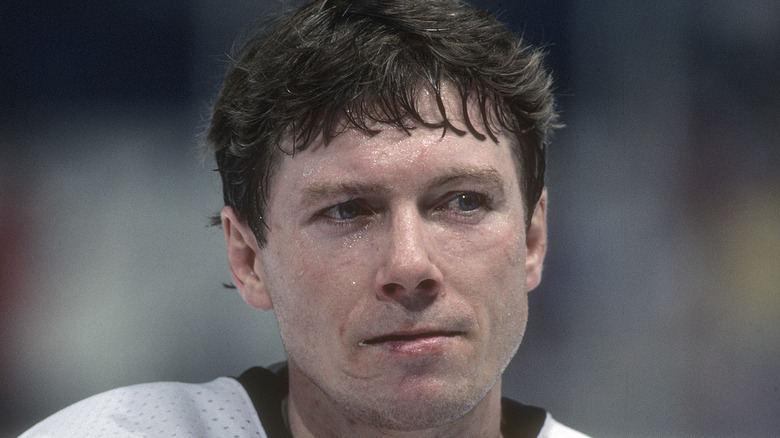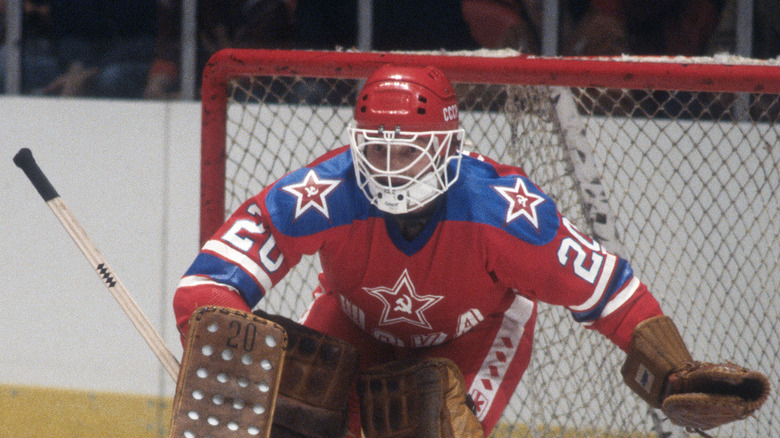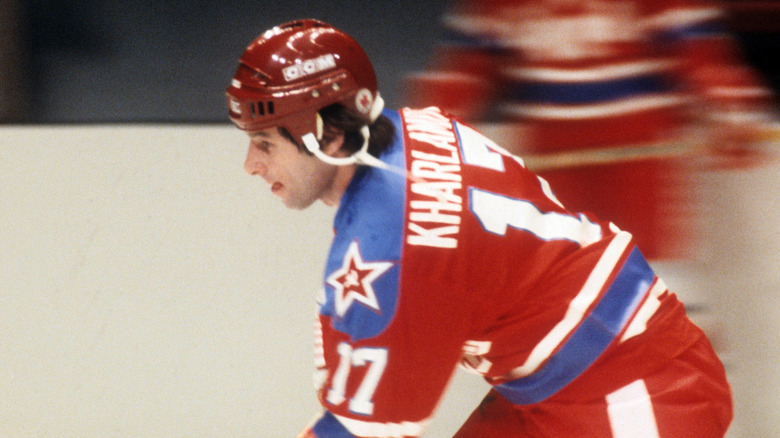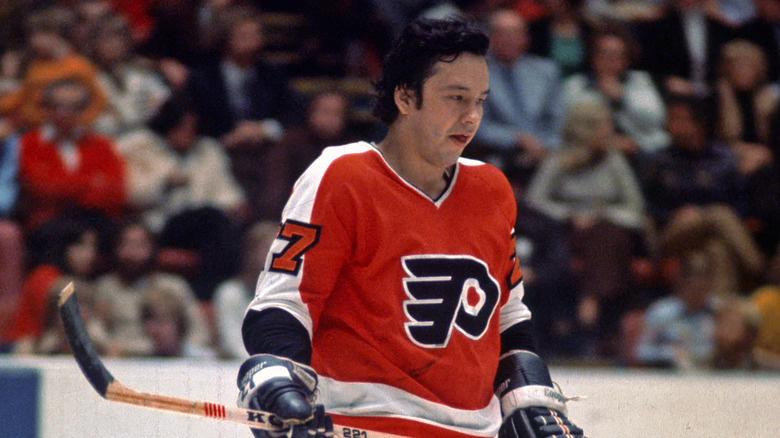How The Philadelphia Flyers Chased The Soviet Union Off The Ice
In the 1970s, two hockey teams struck fear into the hearts of the opposition, teams who made other players' hands shake as they laced up their skates. In the NHL the team that could garner that kind of reaction was the Philadelphia Flyers, captained by Bobby Clarke (above). The Flyers became known as The Broad Street Bullies (per Bleacher Report), a name derived from their home arena — the Spectrum — which sat on Broad Street in South Philadelphia, and the bruising aggressive style of play that became their calling card and helped them win a pair of back-to-back Stanley Cups in the middle of the decade.
On the international stage, the Soviet Union's Red Army Team dominated the Olympics like few teams in any sport have before or since. According to QuantHockey, their streak of virtually uncontested dominance started at the 1964 Winter Games in Innsbruck, Austria and they continued to win Olympic hockey gold every four years like clockwork until they were knocked off the top step of the podium by the United States at the 1980 Lake Placid Winter Olympics in what became known as the Miracle on Ice.
During the Cold War, the Soviets were always looking for ways to assert their sporting dominance, and one way they did this was by embarking on an exhibition tour across the United States which would pit them against the best the National Hockey League had to offer. Only it wouldn't end the way they thought.
The two most terrifying hockey teams in the world meet
According to Vox, like most of what happened in the Soviet Union, the Red Army team was controlled by the government, which used them as a tool to show off what they perceived to be the virtues of communism.
In 1975, the NHL and Soviet representatives struck a deal for two Soviet teams — the Red Army Team (also known as CSKA Moscow) and Soviet Wings — to play a series of games against NHL clubs. According to Greatest Hockey Legends, this series of exhibition games became known as Super Series '76. The Red Army's itinerary included stops in New York City, Montreal, Boston, and finally Philadelphia.
The tour started on a high note for the Red Army as they trounced the New York Rangers 7-3 at Madison Square Garden. Next up was the Montreal Canadiens who fought the Red Army to a 3-3 draw and would go on to beat the Flyers in the Stanley Cup Finals later that season.
This matchup was significant in that it featured two teams with polar opposite approaches on how to play hockey. The Soviets were known for their speed and finesse, featuring players like Boris Mikhailov who a few years later wore the captain's "K" for the Soviets at the 1980 Olympics. Between the pipes (via Flyers History) was legendary goaltender Vladislav Tretiak (above). Meanwhile, the Flyers were known for their ferocious physical play that often made opponents mysteriously come down with a case of the "Philly flu," often induced by tough guys like Dave "The Hammer" Schultz, who amassed more than 2,000 career penalty minutes (via Hockey Reference).
The Soviets visit Broad Street
Going into the game between the Flyers and the Red Army there was already animosity. According to The Canadian Encylopedia, during the 1972 Summit Series between Canada and the Soviet Union, Flyers captain Bobby Clarke had injured the Red Army's Valeri Kharlamov's ankle with a slash (via Bleacher Report).
However, the player that would help make the Flyers-Red Army game legendary was Flyers defenseman Ed Van Impe. Van Impe was leaving the penalty box when Valeri Kharlamov turned his head while trying to receive a pass from behind. Kharlamov was promptly knocked out with a ferocious open-ice hit courtesy of the Flyers D-man. "I just wanted to welcome him to Philadelphia," he told The Philadelphia Inquirer in 2011.
The Soviets were appalled by the hit — perhaps even more so that there was no penalty called on the play — and stormed off to their locker room. According to The Philadelphia Inquirer, Flyers founder and President Ed Sifer and NHL Clarence Campbell chased after the Soviets and told them that if they didn't finish the game, they wouldn't get paid.
"I told them that they wouldn't get paid for the game,” Snider said. "And Clarence looked at me and said, 'Hell, we were supposed to settle up for the whole series after this game.' I said, 'Tell them they're not getting their money.' They were supposed to get $50,000 for each game, so a total of $200,000 was on the line, plus we paid for all of their expenses and whatnot."
The Flyers come out on top
With the prospect of losing $200,000 hanging over their red-helmeted heads, the Red Army team returned to the ice after 17 minutes in their locker room. Before the Soviets retreated, the game was still knotted 0-0, but the crushing check thrown by Van Impe must have still been at the forefront of their minds.
According to Flyers History, Flyers Reggie Leach found the back of the net with a power-play goal 11 minutes and 38 seconds into the first period. The Flyers found twine three more times that game, ultimately winning by a score of 4-1.
"There were a lot of political implications to the game,” Van Impe told The Philadelphia Inquirer. "It was an overwhelming feeling. We had to maintain the image of the NHL, the Broad Street Bullies and the city of Philadelphia. More importantly, we wanted to defend our soil.” To all non-Flyers fans, The Broad Street Bullies were the NHL's biggest villains, but the way they struck fear into the hearts of the Red Army Team galvanized North American hockey fans.
"The thing I remember most was that it was the first time the whole NHL really rooted for us,” Snider said to The Philadelphia Inquirer. "Before that, we were the most hated team in hockey. Campbell and all of the other executives that didn't like us before were all hoping we would crush them.” While the Soviet Union collapsed in 1991, the Red Army Team still operates, playing as CSKA Moscow in Russia's Kontinental Hockey League.



